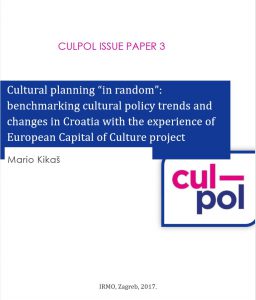Author: Mario Kikaš
Details: CULPOL Issue Paper 3, IRMO, Zagreb, August 2017.
Language: Croatian and English

ABSTRACT
For the first time after the integration in to the European Union, Republic of Croatia will host European Capital of Culture in 2020. Bidding process for ECOC title started in 2015. with nine cities applying in the first phase of that process. Considering the size of Croatia and its population, nine cities applying for the title was significant number, especially if we take into account deficit of national and local cultural policies and planning. Consequently, the ECoC bid-process was seen as the opportunity for cultural development of number of Croatian cities dealing with various set of problems: rapid tourist development (Dubrovnik), demilitarization (Pula), deindustrialization (Rijeka), identity issues (Zagreb, Split, Zadar) and being remoted from the central stage of cultural production and development in Croatia (Osijek, Đakovo, Varaždin).
The first and the last attempt of national cultural planning was made in the early 2000’s. The document of National Strategy of Cultural development was written, deliberated and finally passed in the Parliament, but without implementation in the future. Thus, Croatian cultural planning is designated by the authors of this strategy Biserka Cvjetičanin and Vjeran Katunarić as: “in random” which depicts national and local cultural policies in Croatia until today. Bid-process for European Capital of Culture demanded from every city to prepare its strategy of local cultural development i.e. the bid-process for ECoC title was in fact – the new stage of cultural planning in the Croatia resulted in eight local cultural strategies that should be implemented in next years. However, that doesn’t mean that the bid process has been devoid of “in random” approaches, often stumbling upon different barriers: political instability on the local and national level, marginal position of culture in local and national decision making, institutional anachronism in cultural, low capacities and non-developed cultural infrastructure. All of these aspects marked the bid-process for Croatian ECoC finally designated to the city of Rijeka.
Beside these contextual peculiarities of Croatian cultural policies and planning, the ECoC bid process, or ECoC project as such is marked by its inadequacy for cultural context such is Croatian, but Eastern and Central European as well. European dimension as the buzzword of ECoC project became the metaphor of different understanding and approaches to the ECoC project which needs significant changes if it wants to stay sustainable European project of cultural development
These issues, as well as the previous ones were addressed through focus groups of members of project teams of bidding-cities. Meeting organized on December 9 2016 in Zagreb was the first opportunity for the project team members to makea critical reflectionon different aspects of ECoC project and bid-process in Croatia. The stataments of the focus-groups participants were of great importance in creating this thematic paper.
